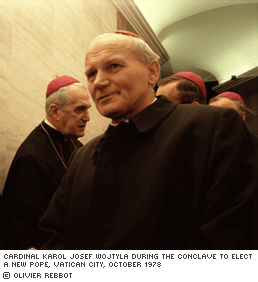 |
Karol Jozel Wojtyla, the future Pope John Paul II, was born in Wadowice, Poland on May 18, 1920. His mother died when he was eight years old, followed by his older brother four years later. When he was nineteen, Nazi Germany invaded Poland, which it occupied throughout World War II. Shortly after the death of his father in 1941, Wojtyla, a gregarious youth with an interest in poetry and theater, clandestinely studied for the priesthood and was ordained a year after the war’s end. By then the Soviet Union had dropped the “Iron Curtain” around Poland, and the experience of living under communist rule would be a defining feature of the future pope’s life. In 1958 Wojtyla became the archbishop of Krakow, participating in the reformist Vatican II council four years later. In 1967, he was appointed cardinal by Pope Paul VI. On October 16, 1978, following the sudden death of Pope John Paul I after a month in office, he was chosen as the first Polish pope and the first non-Italian in 455 years. His 26-year reign, the second-longest in papal history, was marked by theological conservatism and an unprecedented evangelical campaign that took John Paul II to over a hundred nations. One of the most recognizable and popular figures in the world — especially after being wounded in the unsuccessful assassination attempt in St. Peter’s Square in 1981 — he helped spread the Roman Catholic doctrine to South America and Africa, and was widely credited with assisting the rise of the Solidarity Labor Movement in his homeland, presaging the disintegration of the Soviet Empire. He died on April 2, 2004 at the age of 83, having reinvigorated the Church and shepherded its flock into a new century. |